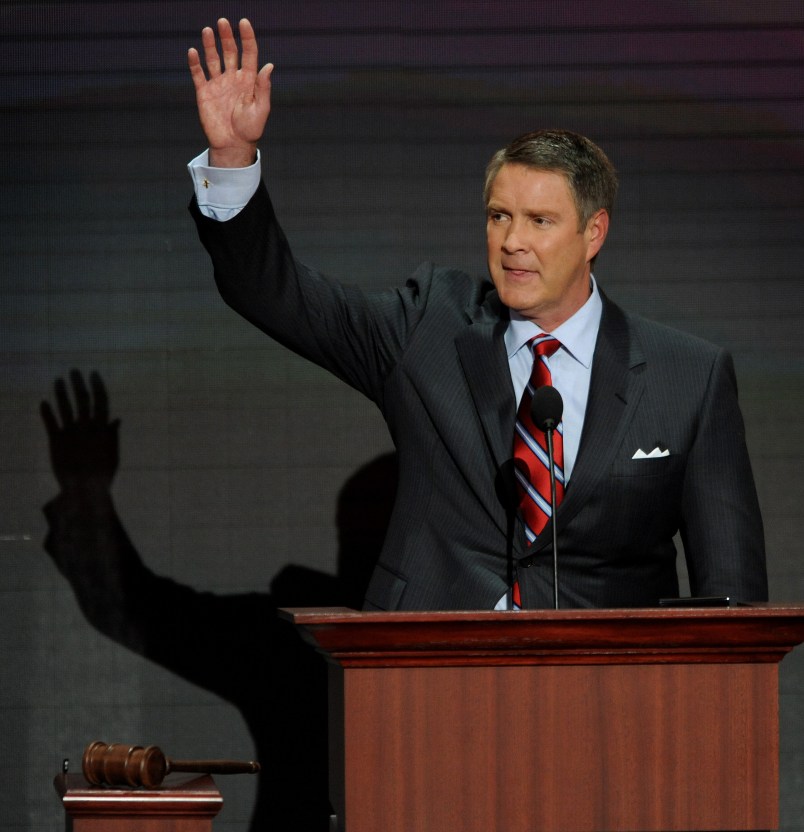Echoing President Obama’s “the time is now” call to action on health care reform, former Senate Majority Leader Bill Frist (R-TN) writes in his new book that those who argue Obama is trying to do too much, too fast, with too much money should ask themselves: “Can we afford to do nothing about a wasteful and inefficient health-care system that drains billions from our economy, weakens the competitiveness of thousands of businesses through excess costs and yet fails to deliver basic care to far too many of our citizens?”
Released today, “A Heart to Serve,” is “not a political memoir,” Frist tells fans on his Web site. But with its seeming embrace of Obama and health care reform, the book has thrust Frist back into the political arena.
Democrats boasted that Frist was among the Republican supporters of the plan when over the weekend, the former leader told Time that even though it’s not perfect, he would vote for the health care bill if he were still in the Senate. Frist told Time’s Karen Tumulty he knew he would “take heat” but, “that’s what leadership is all about.”
Too much heat maybe? Today Frist seemed to walk it back, telling ABC News Radio:
There are five bills on the floor now — none of them are perfect. People try to put words in my mouth saying “You support the Baucus bill.” I don’t support the Baucus bill as written today.
Greg Scandlen of the conservative Heartland Institute complained over the weekend about Frist’s comments, telling Tea Partiers in comments to a private email list that were obtained by TPMDC that they should direct their “venom” at the former leader.
Another tea partier replied to Scandlen, “It’s obvious Frist does not want to ever be elected to office again.”
(Frist tried to post a response to the Time article this morning on his Web site, but clicking on it brings up a dead link that says the page can’t be found.)
In the book, the heart surgeon writes, “We have a moral responsibility, I believe, to see that every single American has affordable access to health care.”
“The need to improve the productivity, fairness and consistent quality of American health care is deeply intertwined with our economic problems. Fixing health care will help the economy,” Frist wrote. “Thus, I strongly support the administration’s determination to act on both fronts simultaneously, great as the challenges will be.”
Frist is telling supporters he didn’t want to write a boring book and that his goal is to “unveil useful leadership and service principles through storytelling the up and down experiences of my life in the South, in the surgical operating room, in the Senate chamber of the U.S. Capitol, and in primitive medical clinics throughout east Africa.”
Indeed, one of the book’s first stories on helping the sick in Sudan was about a man with a “testicular mass as large as a football.”
In the book Frist also lauds Obama for investing in electronic medical records in the stimulus plan and takes what could be considered a swipe at Rush Limbaugh:
“In 2008 we elected a new president who ran, in part, on a promise to change the tone in Washington. He has his work cut out for him! Ironically, our previous president made exactly the same pledge – which he proved unable to keep. Like the overwhelming majority of Americans, I hope President Obama will succeed in the effort. But restoring civility to Washington won’t be an easy task. It will surely require a genuine commitment by all of us, both inside and outside government. I would love to see it happen – for the good of the country.”
It’s worth pondering Frist’s motivation in writing the book – before he left the Senate he was considered a possible presidential candidate. Those ambitions fizzled out and he’s been quiet in recent years with a focus on his humanitarian work. But if health care reform were to pass and be considered a success, there might be political traction for a mainstream Republican who did not indulge in tea party extremism at crunch time. But then again, as Frist’s apparently quick retreat suggests, any support for Obama is perceived by Republicans as giving aid and comfort to the enemy in a time of war.









